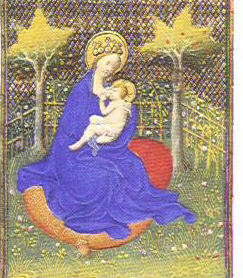Every birthday is special, but that of our Lady is very precious.
The hoped-for day of the blessed and venerable Mary ever a Virgin has now come; therefore let our earth rejoice with great gladness, illuminated by the birth of so great a Virgin. For she is the flower of the field from which came forth the priceless lily of the valley. (Augustine)
Let the whole creation, therefore, sing praise and dance and unite in celebrating the glories of this day. To-day let there be one common feast of all in heaven and earth. Let everything that is, in and above the earth, join together in rejoicing. For today a shrine is built for the creator of the universe. The creature is newly ready as a divine dwelling for the creator. (Andrew of Crete)
Let us rejoice therefore with Joachim and Anna, the parents of Mary:
What is this sound of feasting that we hear?
Joachim and Anna mystically keep festival.
'O Adam and Eve,' they cry, 'rejoice with us today:
For if by your transgressions you closed the gates of Paradise to those of old,
We have now been given a glorious fruit,
Mary the Child of God
Who opens its entrance to us all.'
Tradition suggests that Mary's birth was the result of fervent prayers by her parents, Joachim and Anna.
By your holy nativity, O most pure Virgin,
Joachim and Anna were set free from the reproach of childlessness,
And Adam and Eve from the corruption of death.
Delivered from the guilt of sin,
Your people keep the feast and sing:
'The barren woman bears the Theotokos,
the Sustainer of our life.'
Through her birth and holy life she was destined to be the Mother of God.
Thy nativity, O Theotokos,
Hast brought joy to all the world:
For from thee has shone forth
The Sun of Righteousness, Christ our God.
He has loosed us from the curse and given the blessing:
He has vanquished death, and bestowed on us eternal life.
Mankind is renewed by the birth of Mary:
Be renewed, O Adam, and be magnified, O Eve;
You prophets, dance with the apostles and the righteous;
Let there be common joy in the world among angels and mortals
For the Theotokos is born today of righteous Joachim and Anna. From the Orthodox for the Nativity of Theotokos
The nativity of Mary has been kept by the East since the early 6th C, and was adopted by the Western Church in the 7thC, and has been observed on the 8th September ever since. We know very little historically about the circumstance of Mary's birth. Traditionally her parents were Anna and Joachim, as found in the apocryphal gospel of James, and also mentioned by Gregory of Nyssa, John Damascene and others. Some of these writers add that the birth of Mary was obtained by the fervent prayers of Joachim and Anna in their advanced age. As Joachim belonged to the royal family of David, so Anna is supposed to have been a descendant of the priestly family of Aaron; thus Christ the Eternal King and Priest sprang from both a royal and priestly family.
Perhaps Mary was born in Nazareth. A certain tradition maintains that she was conceived and born in the same house in which the Word became flesh. Another tradition, upheld by John Damascene says that she was born in Probatica, a name probably derived from the sanctuary's nearness to the pond called Probatica or Bethsaida in John 5:2.
The birth of Mary has often been seen as unifying the old Covenant ie. the Law, with the New i.e. is the fulfilment of the Law in Christ.
As St. Andrew of Crete wrote
The law has achieved its goal with Christ, who leads us away from the letter of the law so as to bring us to the spirit. The law is fulfilled because the lawgiver himself has brought it to completion, transforming in his own person the letter of the spirit, summing up all things in himself and living the law of love. He has made law subject to love, and brought love and law into harmony.
This is the summary of the benefits Christ has secured for us. In Christ the mystery is unveiled, nature is made new, divine and human, and the deification of our human nature is assumed by God. but so radiant, so glorious a visitation of God among mortals required some prelude of joy to introduce to us the great gift of salvation. Today's feast, celebrating the birth of the God-bearer, is that prelude, and the final act is the destined union between the Word and human nature.
Just as Christ is the 2nd Adam, so Mary is the 2nd Eve.
By her child-bearing the nature inherited from our first parents is changed, their fault wiped out. In her that sentence passed on Eve was remitted which said, "In sorrow shall you bring forth children," for Mary brought forth the Lord in joy.
Eve sorrowed, but Mary exulted; Eve carried weeping in her womb, but Mary carried joy, for Eve brought forth a sinner, but Mary innocence itself. The mother of our race brought punishment into the world, but the Mother of our Lord brought salvation into the world. Eve was the source of sin, Mary the source of merit. Eve by killing was a hindrance, Mary by giving life was a help. Eve wounded, Mary healed. Obedience takes the place of disobedience, faith makes up for faithlessness. (Augustine)
She who was destined to bear the incarnate Son of God has been the inspiration of Christians by her surrender to the will of God. Since Mary uttered those immortal words, 'Be it unto me according thy word,' how countless times that prayer has been offered to God by faithful Christians who like Mary have desired nothing else but to do God's will. She is the exemplar for us all on our pilgrimage. Pray God that this is our continual prayer.
Mary may now play on her instruments, the Mother strike the cymbals with swift fingers. The joyful choruses may sound out and songs alternate with sweet harmonies. Hear, then, how she sings, she who leads our chorus. For she say, "My soul magnifies the Lord, and my spirit rejoices in God my Saviour; because He has regarded the lowliness of His handmaid; for, behold, henceforth all generations shall call me blessed; because He who is mighty has done great things for me." And so the miraculous new birth takes away the cause of our increasing burden of sin, and Mary's song puts an end to the weeping of Eve. (St. Augustine).
So "let the soul of Mary be in each of [us] to magnify the Lord. Let the spirit of Mary be in each one [of us] to exult in God." (Ambrose)

